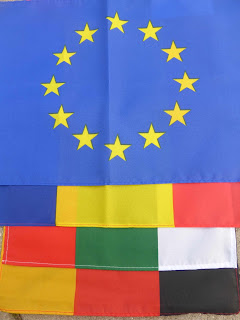It's three schools who have been working on all the eTwinning-projects we did:
- Liceul Teoretic Nichita Stanescu, Bukarest, Romania
- General secondary school Vasil Levski, Dolni chiflik, Bulgaria
- Kaufmannsschule II, Hagen, Germany.
The project combines virtual learning and communication with personal experience at transnational project meetings. The three applying schools have a wealth of experience in international projects using the eTwinning platform. Staff and pupils at the schools meet people of different cultural and religious backgrounds both at school and in their freetime. There has been migration between the three countries of Bulgaria, Germany and Romania and recently the debate about migration from Romanians and Bulgarians to Germany has triggered many stereotypes. We believe that misconceptions about other nations and cultures can only be overcome by communication and interaction. Thus the project focuses on virtual communication and interaction as well as transnational project meetings.
One of the objectives is to find ways of encouraging students to meet of different cultures and to overcome common prejudices though working on the same project and doing assignments in international group work. At the same time this will be supported by face-to-face meetings which cannot completely be replaced by virtual interaction. The consortium will survey students on the conception of other nations before the project, during international group work and after transnational project meetings to find out if communication, interaction and personal meetings have an influence on their opinions.
The project will start with a meeting at the coordinating school in Hagen which will focus on organisational issues and train staff to carry out the project efficiently (e.g. intercultural training, successful blogging, using eTwinning, scientific input on migration). Pupils will be involved in order to work as multipliers for the project at each school. The teachers will be members of the project team and the pupils will be chosen among those interested.
The next project step will be the investigation of migration involving the three countries, approaches will include historical research, interpretation of statistics and interviewing people with a migrational background. Students will learn how to present their findings in a virtual classroom. These acitvities will lead to the project meeting in Romania at which the ebook "History of Migration: The cases of Bulgaria, Romania and Germany" will be presented to the public.
The next project step looks at the current situation and students' feelings towards each other (results from the surveys) and focuses on multicultural concepts and issues. The focus is on the development of a strategy of managing multiculturality at all schools - staff and students defining general needs and special content for each school. These strategies will be presented at the transnational project meeting in Bulgaria which will also identify steps for implementing those strategies.
The last project step is devoted to religion as the political situation at the moment calls for interreligious dialogue in order to make students strong against extremist views. We believe that if you know facts and believers you are less likely to develop hostile attitudes against a different religion. This leads to the last project meeting in Hagen in the Ruhr area which is a melting pot regarding religions. We also want to look at the role the EU plays in the area of multicultural policies and plan to visit Brussels to get first-hand experience.
Last but not least we hope to influence our students and staff to be open-minded concerning multicultural settings and enable students to work in international environments using ICT.

No comments:
Post a Comment
Thank you for your comment.